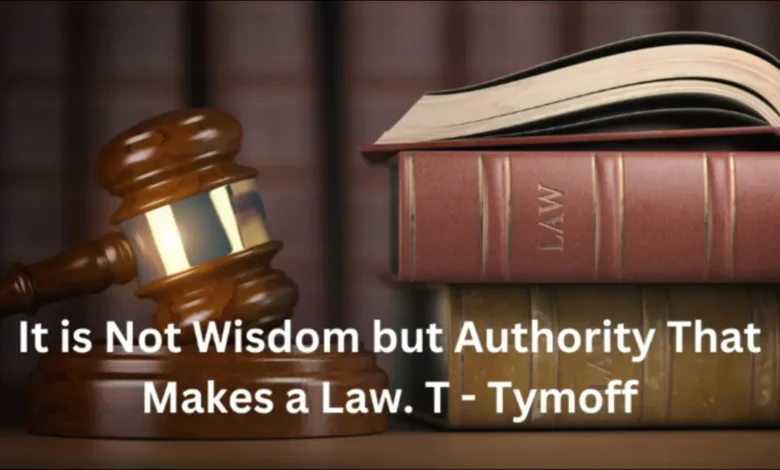It is not wisdom but authority that makes a law. t – tymoff

Introduction it is not wisdom but authority that makes a law. t – tymoff
In the realm of legal philosophy and ethics, the quote by Tymoff, ‘it is not wisdom but authority that makes a law ‘, it is not wisdom but authority that makes a law. t – tymoff serves as a thought-provoking starting point for our exploration.Laws shape the fabric of our society, guiding behavior and maintaining order. But what truly underpins these laws? A thought-provoking quote by Tymoff asserts that “it is not wisdom but authority that makes a law.” This statement invites us to delve into the intricate relationship between wisdom and authority in legislation. Are laws reflections of power, or can they be grounded in something more profound? Let’s explore this dynamic interplay and uncover how it influences the rules we live by today.
Understanding the difference between wisdom and authority
Wisdom and authority, though often conflated, play distinct roles in the context of law. Understanding this difference is crucial for a comprehensive grasp of the legal landscape.
Wisdom comes from experience, reflection, and a deep understanding of human nature. It encourages thoughtful consideration and moral reasoning when creating laws. Wise decisions prioritize justice and the well-being of society.
On the other hand, authority is the power to enforce rules or commands. This power doesn’t necessarily stem from knowledge or ethical deliberation; it may come simply from holding a position of influence.
While wisdom seeks truth and fairness, authority can sometimes impose control without regard for these principles. A legal system based solely on authority risks becoming rigid and unjust, while one rooted in wisdom promotes adaptability and compassion. it is not wisdom but authority that makes a law. t – tymoff Recognizing this distinction helps illuminate how laws affect our lives differently depending on their foundation.
Examples of laws created based on wisdom and authority
Wisdom-based laws, it is not wisdom but authority that makes a law. t – tymoff emerging from a deep understanding of human behavior and societal needs, have the potential to significantly impact our society. Consider environmental regulations, for instance. it is not wisdom but authority that makes a law. t – tymoff Many countries have enacted laws to protect endangered species based on scientific insight into ecosystems’ delicate balance. These laws, rooted in wisdom, not only protect our environment but also shape our collective behavior and values.
On the other hand, authority-driven laws can sometimes lack this depth. Speed limits are enforced by governing bodies primarily for safety reasons, but they may not always consider local conditions or community input.
Consider criminal justice as well. Some legal systems impose mandatory sentencing based purely on established guidelines rather than the nuances of each case’s it is not wisdom but authority that makes a law. t – tymoff circumstances. This approach might neglect factors that could lead to more equitable outcomes.
In contrast, restorative justice models draw from wisdom by focusing on healing and rehabilitation instead of punishment. Each example highlights how different foundations—wisdom versus authority—shape our legal landscape uniquely.
The impact of wisdom-based laws vs authority-based laws
Wisdom-based laws often reflect a deeper understanding of human nature and societal needs. These laws emerge from thoughtful deliberation, context, and ethical considerations. it is not wisdom but authority that makes a law. t – tymoff They tend to foster trust among citizens and promote cooperation.
In contrast, authority-based laws can be seen as impositions from those in power. While they may temporarily maintain order, they risk alienating the populace. People may follow these rules out of fear rather than respect or belief in their righteousness.
An authority-driven legal system, with its inherent rigidity, can stifle innovation and adaptability within society. This can create an environment where dissent is not tolerated, potentially leading to unrest.
Conversely, it is not wisdom but authority that makes a law. t – tymoff wisdom-infused regulations adapt over time as they grow with collective knowledge and experience. This flexibility allows for a more harmonious coexistence between governance and community values.
Criticisms of authority-based laws it is not wisdom but authority that makes a law. t – tymoff
Authority-based laws often face significant criticism for their top-down approach. Critics argue that such laws can lack the necessary context and understanding of local needs. When decisions are made solely by those in power, they may overlook important cultural or social nuances.
Additionally, these laws can perpetuate injustice. If authority figures prioritize control over fairness, marginalized communities may suffer disproportionately. This imbalance creates an environment where compliance is expected without question.
Another concern is the potential for abuse of power. it is not wisdom but authority that makes a law. t – tymoff Laws derived from sheer authority risk becoming tools for oppression rather than mechanisms for protection or justice. Historical examples abound where regimes have enacted strict regulations to maintain dominance. This potential for abuse underscores the urgency of addressing the imbalance between authority and wisdom in lawmaking.
Critics highlight that reliance on authority stifles public engagement and discourse. A legal framework built solely on commands discourages citizens from participating meaningfully in the democratic process, leading to apathy towards governance. This lack of public engagement underscores the need for a more democratic and inclusive lawmaking process.
The importance of balance between wisdom and authority in lawmaking
Striking a balance between wisdom and authority in lawmaking is crucial for creating effective legislation. Authority brings structure and enforceability, while wisdom ensures that laws reflect ethical considerations and societal values.
When these elements are harmonized, laws can adapt to the complexities of human behavior. Wise lawmakers consider what can be enforced and what should be upheld as moral or just.
Conversely, an over-reliance on authority risks imposing rigid rules that may ignore nuance. This often leads to discontent among those affected by such laws.
Moreover, engaging diverse voices fosters a more comprehensive understanding of issues at hand. When wisdom informs authority, the resulting legal framework will likely benefit society rather than serve as punitive measures.
Fostering dialogue between these two aspects encourages proactive rather than reactive governance, paving the way for sustainable progress in lawmaking practices.
Conclusion: Striving for a balance between wisdom and authority in creating just laws
A fair society must strive for a balance between wisdom and authority in creating just laws. Tymoff’s quote reminds us that while authority can enforce laws, it does not necessarily equate to justice or morality. Laws rooted solely in authority may lack the nuance and understanding that come from wisdom.
When lawmakers prioritize both elements, they create frameworks that are not only enforceable but also equitable. This balance ensures the community’s needs are met while upholding individual rights and freedoms. it is not wisdom but authority that makes a law. t – tymoff Emphasizing wisdom in legislation encourages critical thinking and reflection on societal values.
it is not wisdom but authority that makes a law. t – tymoff Effective lawmaking requires dialogue between those with authoritative power and wise counsel from diverse perspectives. By fostering this collaboration, we pave the way for laws that resonate with justice and fairness—a goal worth striving toward daily.





